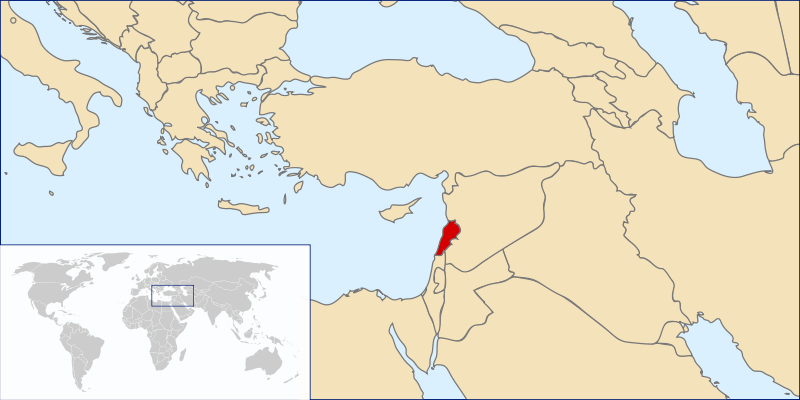
Geography

Source: This image is the intellectual property of Rei-artur. Redistribution under licence CC BY-SA 3.0
Area: 10,400 km2 (1,63% water)
Terrain: Narrow coastal plain, the Bekaa Valley divides the mountains of Lebanon (in the centre of the country, parallel to the coast) and Anti-Lebanon (on the Syrian border)
Highest point: Qurnat as Sawda’ 3,088 m (in northern Lebanon)
Climate: Mild Mediterranean climate, wet winters and hot dry summers. Heavy winter snow in the mountains
Geographical population distribution: About 60% of the population lives in coastal cities, including the Beirut area where over 30% of the population is concentrated
Natural resources: limestone, iron ore, salt, arable land, water surplus
Demographics
Population: 5,097,604 (2025 estimate)Annual population growth: approximately -1.5% (2023–2025 estimate)
Population estimate 2025: 5,097,604 Age distribution:** (latest available data not exact, estimated similar to 2020)
0–14 years – approx. 25%
15–64 years – approx. 67%
65+ years – approx. 8% Fertility rate (children per woman): 1.99 (2025 estimate) Birth rate (births per 1,000 people): 14.5 (2023 estimate) Death rate (deaths per 1,000 people): 5.2 (2023 estimate) Median age: approx. 28.5 years (2023 estimate) Life expectancy (at birth): 79.57 years (2025 estimate)
Men – 77.5 years
Women – 81.5 years Net migration: approx. -25,000 people (2023 estimate) Languages: Arabic is the official language of Lebanon. English, French, and Armenian are also widely used. Religions: Muslims approx. 57.6% (Sunni, Shia, Alawites, others), Christians approx. 43.4% (Maronites, Greek Orthodox, Catholics, others) (2022 estimate) Ethnic groups: Arabs 95%, Armenians 4%, Others 1% (2023 estimate)
Economy
GDP: approximately $19.5 billion (2023 estimate)
GDP per capita: approximately $3,800 (2023 estimate)
Annual GDP growth rate: approximately -6.7% (2022)
Public debt (% of GDP): 178% (2023 estimate)
Inflation (CPI): 123% (2023 estimate)
Unemployment: 35% (2023 estimate, due to economic crisis)
Imports: approximately $7.5 billion (2022 estimate)
Top 10 import partners (% of total imports): China 12%, Greece 7%, Italy 7%, USA 6%, Germany 5%, Turkey 4%, UAE 3.5%, France 3%, Russia 2.5%, Egypt 2.5%
Exports: approximately $1.2 billion (2022 estimate)
Top 10 export partners (% of total exports): UAE 16%, Saudi Arabia 8%, Syria 7%, South Africa 6%, Iraq 5%, Qatar 5%, Switzerland 4.5%, Turkey 4%, Jordan 3%, Kuwait 3%
Global Competitiveness Report (World Economic Forum)
41.2/100 (2023 – rank 120/141)
Index of Economic Freedom (Heritage Foundation)
39.7/100 (2023 – rank 160/180)
Income Inequality Index (Gini – World Bank)
33.2% (2019 estimate)
Prosperity Index (Legatum Institute)
45.1/100 (2023 – rank 120/167)
Military Power
Active personnel: 80,000Army: 77,000
Navy: 1,500
Airforce: 1,500 Defence expenditure (%GDP): 3.0% (2020)
Politics and Governance
Political system: Semi-presidential (2024) President: Michel Aoun (2016-present)Prime Minister: Najib Mikati (2021-present)
Executive power: Executive power is vested in the Council of Ministers, the head of state is the President, and the head of government is the Prime Minister. The President is always a Maronite Christian, elected for a six-year term by the Parliament. The Prime Minister is always a Sunni Muslim, appointed by the President, and is head of the government. The Prime Minister undertakes consultations with parliamentary parties to form the Council of Ministers.
Legislative power: The Parliament exercises legislative power and consists of 128 deputies who are directly elected by citizens for a four-year term. The Speaker of the Parliament is always a Shiite Muslim. The seats are allocated between Christian and Muslim religious groups.
Judicial power: The Supreme Judicial Council appoints judges. The Court of Cassation is the highest court. The Constitutional Council reviews the constitutionality of laws and consists of 10 judges appointed by the Parliament and the Council of Ministers. There are also primary, secondary, and special courts.
Parliamentary parties (seats): Free Patriotic Movement (18), Future Movement (13), Hezbollah (13), Lebanese Forces (12), Amal Movement (10), Progressive Socialist Party (9), Azm Movement (4), Armenian Revolutionary Federation (3), Kataeb Party (3), El-Marada (3), Syrian Social Nationalist Party (3), Arab Liberation Party (2), El-Khazen Bloc (2), Al-Ahbash (1), National Dialogue Party (1), Popular Nasserite Organization (1), Murr Bloc (1), Civil Society Movement (1), Independence Movement (1), Union Party (1), Baath Party (1), Lebanese Democratic Party (1), Independents (24) Last elections: Parliamentary elections 2022 – Official results: Hezbollah 13.5%, Free Patriotic Movement 15%, Amal Movement 9.5%, Lebanese Forces 10%, Future Movement (dissolved, some candidates independent), Progressive Socialist Party 7%, and other parties. Voter turnout was around 41%. Next elections: Scheduled for 2026 (four-year term)Rule of Law - Human Rights
Corruption Perceptions Index (Transparency International)25/100 (2020 - position 149/180) Rule of Law Index (World Justice Project)
0.45/1 (2020 - position 96/128) Global Terrorism Index (Institute for Economics & Peace)
4.395/10 (2019 – position 43/163) Fragile States Index (Fund For Peace)
89.0/120 (2021 – position 34/179) Democracy Index (Economist Intelligence Unit)
4.16/10 (2020 – position 108/167) Press Freedom Index (Reporters Without Borders)
32.20/100 (2021 – position 107/180) Freedom in the World Index (Freedom House)
51/100 (2021)




